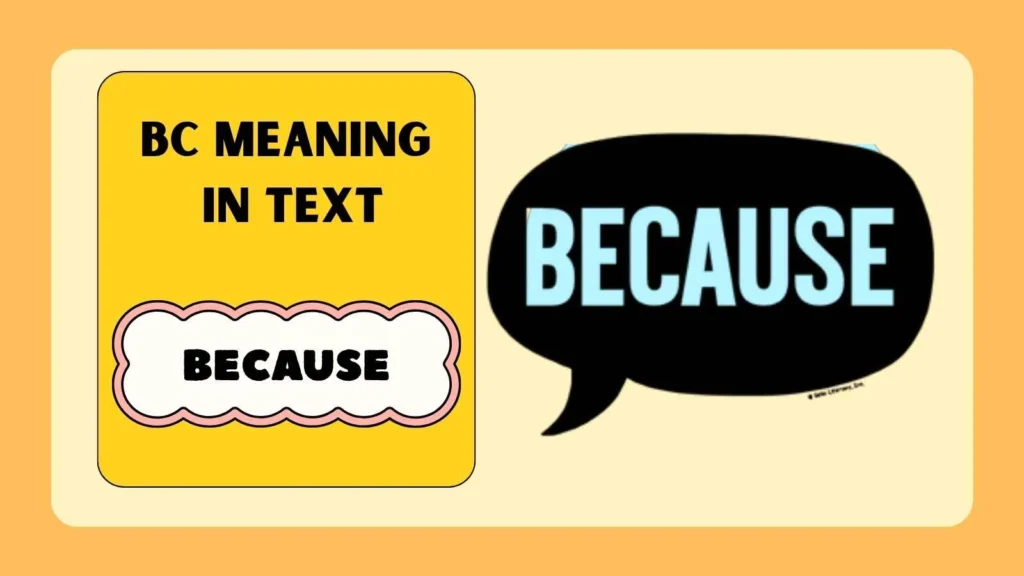In today’s fast-paced digital world, texting has become the primary way people connect. Acronyms and abbreviations save time, but they often leave many scratching their heads. One common abbreviation you may encounter is “BC” in text messages.
At first glance, it seems simple, but its meaning depends heavily on the context. People search for this term because they want clarity whether in casual conversations, social media comments, or even professional chats. Understanding BC meaning in text is important to avoid confusion and miscommunication.
This guide will break down everything you need to know about BC: its definitions, origins, uses in different contexts, common mistakes, and even how it shows up in online communities and dating apps.
By the end, you’ll be able to confidently recognize and respond when someone drops a BC in your inbox or group chat.
Definition & Meaning
The acronym BC generally stands for “Because” in text conversations. Instead of typing the full word, people shorten it to save time. For example:
- “I can’t come tonight bc I’m busy.”
However, BC can also have other meanings depending on the setting. For example:
- Before Christ (in historical contexts)
- Birth Control (in medical or casual conversations)
- British Columbia (a Canadian province, in geographical discussions)
In texting and online chats, the most common meaning remains “because.”
Background & History
The use of BC in text grew during the early 2000s, alongside the rise of SMS messaging. Limited character counts made abbreviations a necessity. Just like “u” replaced “you” and “brb” meant “be right back,” BC became the go-to shorthand for “because.”
Interestingly, BC existed long before texting, in academic and religious settings as “Before Christ” to mark historical timelines. Its crossover into casual digital communication shows how language evolves with technology. Today, it’s recognized worldwide, though interpretations still vary by context.
Usage in Various Contexts
BC meaning in text shifts depending on where and how it’s used:
- Casual texting: Most often stands for “because.”
- Medical/health talks: May refer to “birth control.”
- Geography: Used as shorthand for “British Columbia.”
- History/religion: Refers to “Before Christ.”
- Social media posts: Usually “because,” especially in memes or short captions.
For example:
- “I didn’t reply bc I fell asleep.” (casual)
- “I’m on BC.” (medical)
- “I’m traveling to BC this summer.” (geography)
Common Misconceptions & Clarifications
Many people misunderstand BC in text because it carries multiple meanings. Some common misconceptions include:
- Assuming it always means “Before Christ.”
- Believing it’s formal or professional—when in reality, it’s casual.
- Confusing it with corporate or technical abbreviations.
The safest approach is to read the surrounding context. A medical chat will not use BC the same way a meme page does.
Similar Terms & Alternatives
Instead of using BC, texters often use:
- Cuz or ’cause (informal)
- Cos (UK variant)
- Bcoz (popular in older SMS style)
For historical or religious contexts, BC is sometimes replaced with BCE (Before Common Era).
How to Respond to This Term
When someone uses BC in text, the best way to respond is to simply understand it in context. If it means “because,” you can reply naturally without overthinking. If it seems unclear, politely ask, “Do you mean because, or something else?” This shows attentiveness and avoids misinterpretation.
Regional or Cultural Differences
- In North America, BC often refers to “because” or “British Columbia.”
- In religious contexts worldwide, BC means “Before Christ.”
- In healthcare conversations, BC can refer to birth control, but this is more common in private or medical discussions.
Cultural background strongly influences which meaning comes to mind first.
Comparison with Similar Terms
Unlike other shorthand terms such as LOL or BRB, BC doesn’t express emotion but rather functions as a connector in a sentence. It’s more practical than expressive, making it one of the most functional abbreviations in texting culture.
Usage in Online Communities & Dating Apps
In online groups, BC meaning in text almost always translates to “because.” Memes and captions often shorten sentences with BC to sound casual. On dating apps, however, if someone mentions “I’m on BC”, it refers to birth control. Reading tone and topic is key to avoiding misunderstandings.
Hidden or Offensive Meanings
While BC is not inherently offensive, some slang communities may assign different interpretations, such as using BC as part of playful insults. However, this usage is rare and usually dependent on niche groups. Generally, BC remains a safe abbreviation.
Suitability for Professional Communication
In professional settings, it’s best to avoid BC altogether. Using the full word “because” looks more polished and respectful. While BC is fine in casual texting, business emails, formal reports, or workplace chats should stick to standard English.
FAQs
What does BC usually mean in text?
It most commonly means “because.”
Can BC mean “Before Christ” in texting?
Only if the conversation is historical or religious.
Is BC professional to use at work?
No, always use the full word “because.”
Does BC stand for birth control?
Yes, in certain health or personal contexts.
What’s the difference between BC and BCE?
BC means “Before Christ,” while BCE means “Before Common Era.”
Should I use BC on dating apps?
Yes, but be clear with context since it may mean “because” or “birth control.”
Conclusion
The meaning of BC in text depends entirely on where and how it’s used. In casual messaging, it almost always stands for “because.” But in different settings, it may mean “Before Christ,” “Birth Control,” or even “British Columbia.” Context is the key to understanding it correctly.
While perfectly fine in everyday chats, it’s best avoided in professional communication. By recognizing its variations, you’ll always be prepared to interpret BC accurately and respond with confidence.
